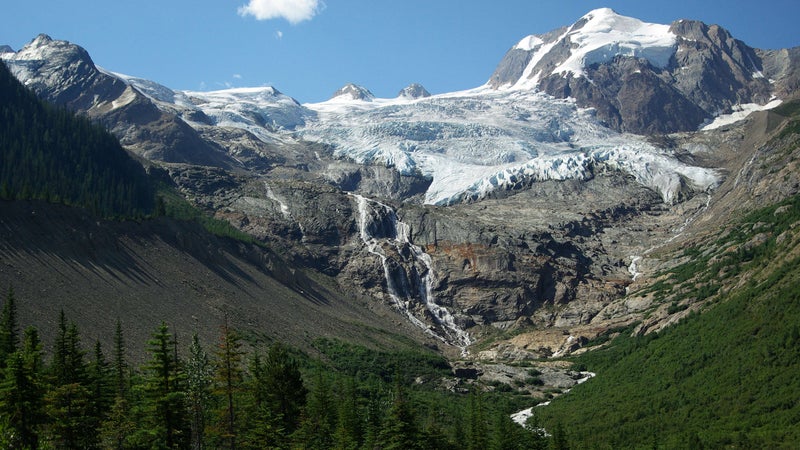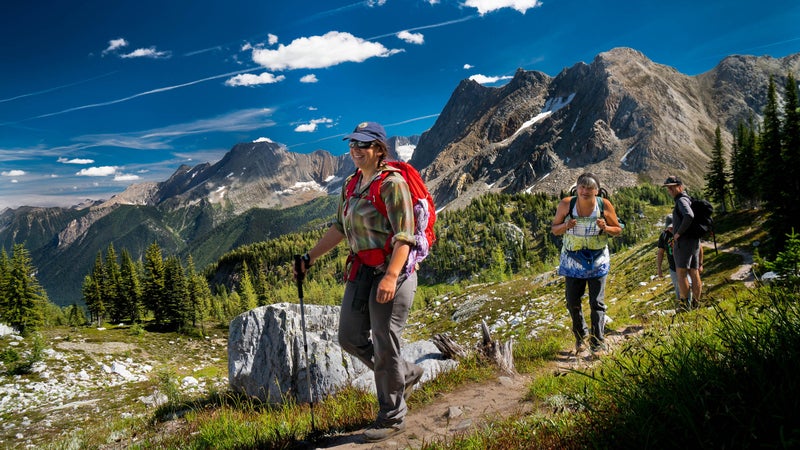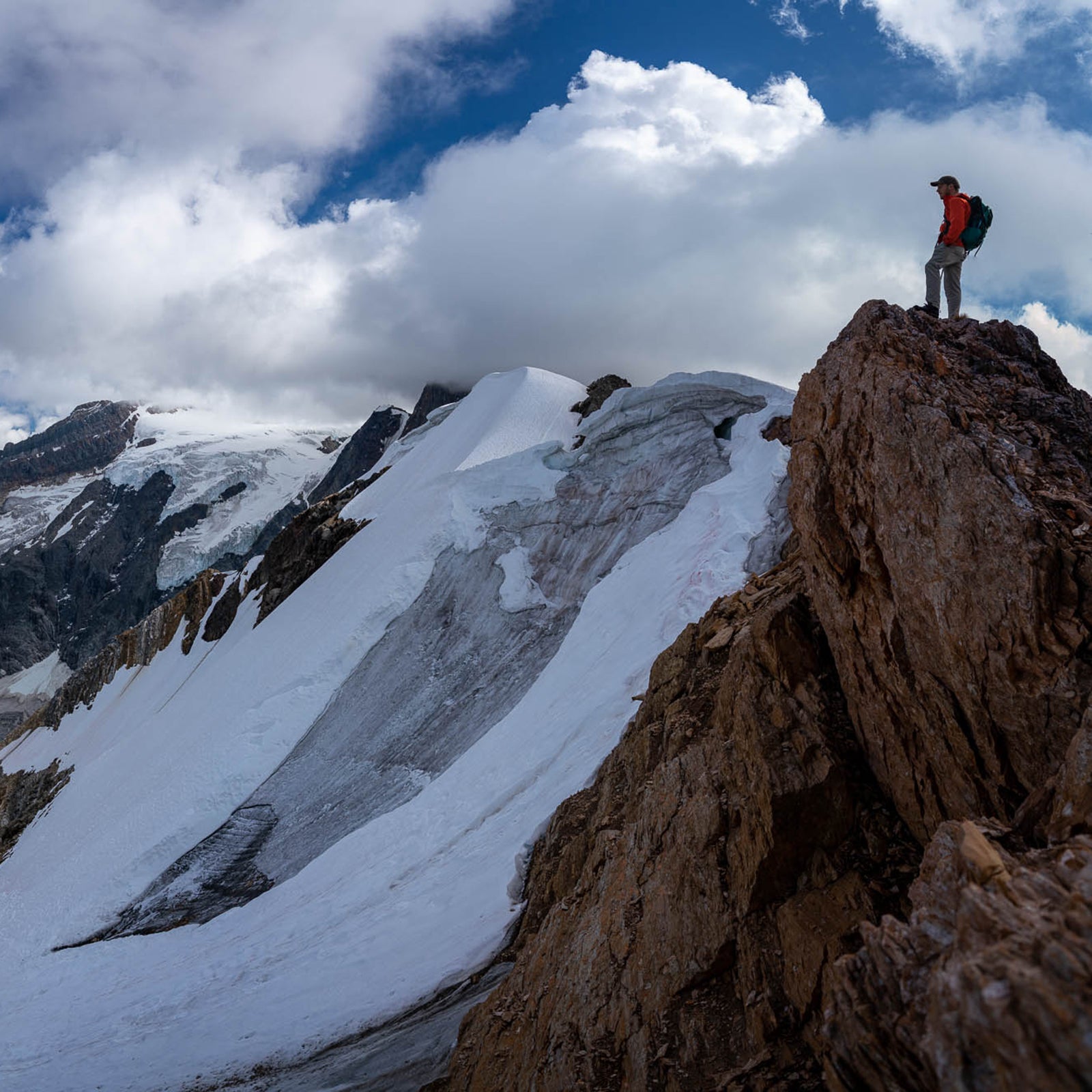What would have been North America’s largest and highest-elevation ski area—a massive year-round resort called Jumbo Glacier planned for the base of Jumbo Mountain, west of Invermere, British Columbia—is now, officially, never going to exist.
Jumbo Glacier Resort has been in the works for nearly 30 years. The ski resort—which was projected to have nearly 15,000 acres of skiable terrain and over 5,000 vertical feet—was initially proposed back in 1991, and has spent three decades tied up in legal battles that went all the way to the Supreme Court of Canada.
Located in an area known as Qat’mak, the region is considered a sacred place for the local people. It’s also in a critical habitat corridor known for its grizzly bear population. Environmental groups and the Ktunaxa Nation have been trying to stop the ski resort from being built for many years now.
Finally, they’re getting the last say.

This weekend, at a ceremony in Cranbrook, B.C., members of the Ktunaxa Nation, along with environmental organizations and governmental agencies, announced a plan to create an Indigenous Protected and Conserved Area over a swathe of the Purcell Mountains that includes the Jumbo Valley. The designation aims to protect cultural values and biological diversity in the area.
“The fact that we’re here, in 2020, with something we’ve been dealing with 30 years, is an indication that the world is changing,” Kathryn Teneese, chair for the Ktunaxa Nation Council, said in an interview with �����ԹϺ���. “There is consideration for our voices to be heard. We are finally being recognized as having a say as to what happens to our homeland.”
In a sweeping act of landscape-level protection, the Canadian government and the , acting on behalf of the Ktunaxa Nation—along with a group of private funders that include apparel company —bought out all tenures from Glacier Resorts Ltd., the ski resort development company.
“We’ve been talking with the Ktunaxa for a substantial period of time about this concept, and it’s certainly part of our broader nature agenda,” says Jonathan Wilkinson, Canada’s Minister of Environment and Climate Change. (Canada has a nature protection goal to conserve 25 percent of the country’s land and 25 percent of its oceans by 2025.) “As an indigenous protected space, this area is quite pristine and has important species at risk, including grizzly bears.”
The federal government invested $16.2 million, while an additional $5 million came from Patagonia, the , the , , and the .
Patagonia has been involved in the fight against Jumbo Glacier Resort since 2012, when the brand started financially backing the grassroots efforts of local organization . “As we got to know the story of this area better, we could tell it was a place that truly needed protection. It had this incredible mix of environmental value and also cultural value,” says Hans Cole, Patagonia’s director of environmental campaigns and advocacy. “This place doesn’t need to be another ski resort. It has so much more value than that. Some places are just too special to develop.”

The Ktunaxa Nation will be in charge of stewardship and conservation of the land. Next steps will include defining the boundaries of the protected region and determining access. Although they’re not at this level of detail yet, Teneese said she expects backcountry skiers and hikers will continue to be permitted in the Jumbo Glacier area.
“We want to ensure that this isn’t something that makes the area unapproachable or inaccessible to people,” says Teneese. “We’ll be working with government agencies, private enterprise, and our neighbors who live in the area to ensure that what we’re putting in place will accommodate the broad range of interests that have unfolded over the years in terms of connection to this area. We have so few opportunities to experience a place in as close to its natural form as we can. Let this be one of those places.”
The Jumbo Glacier Resort project has had many roadblocks over the years. Most recently, in August, the B.C. Court of Appeals revoked permission to build after rendering the development’s environmental assessment certificate invalid. “It’s been a monumental effort up until this point, with many years of getting approvals,” says Tom Oberti, vice president of the Pheidias Group, the design and consulting company behind Jumbo Glacier Resort. “The project is officially over. There’s a sense of disappointment but also acceptance and understanding. It’s certainly not what supporters dreamed about, but there is a sense of peace that the controversy has come to an end.”
It was Tom Oberti’s father, Oberto Oberti, who first helped locate the area for the Jumbo Glacier Resort back in the 1990s, when a Japanese company hired him to find the ideal location for a future ski resort. Because of the Jumbo Valley’s high elevation, plentiful snowfall, and accessibility, it was deemed one of the most ideal locations for a ski resort in North America. The Pheidias Group is now consulting on a new ski resort project, the , a year-round ski destination planned for a site more than 500 miles north near Jasper National Park, that’s seen far less opposition than Jumbo.
Meanwhile for those who opposed Jumbo Glacier Resort, this moment marks a landmark decision.
“It’s a hairs-standing-up-on-the-back-of-the-neck kind of moment, joining a small, but growing, number of land protections in Canada that recognize and prioritize the rights of the First Nations,” says Nick Waggoner, filmmaker of the 2015 Patagonia-funded documentary Jumbo Wild. “I couldn’t have dreamed of this outcome for the Ktunaxa, Wildsight, and the citizens of the east and west Kootenays.”


